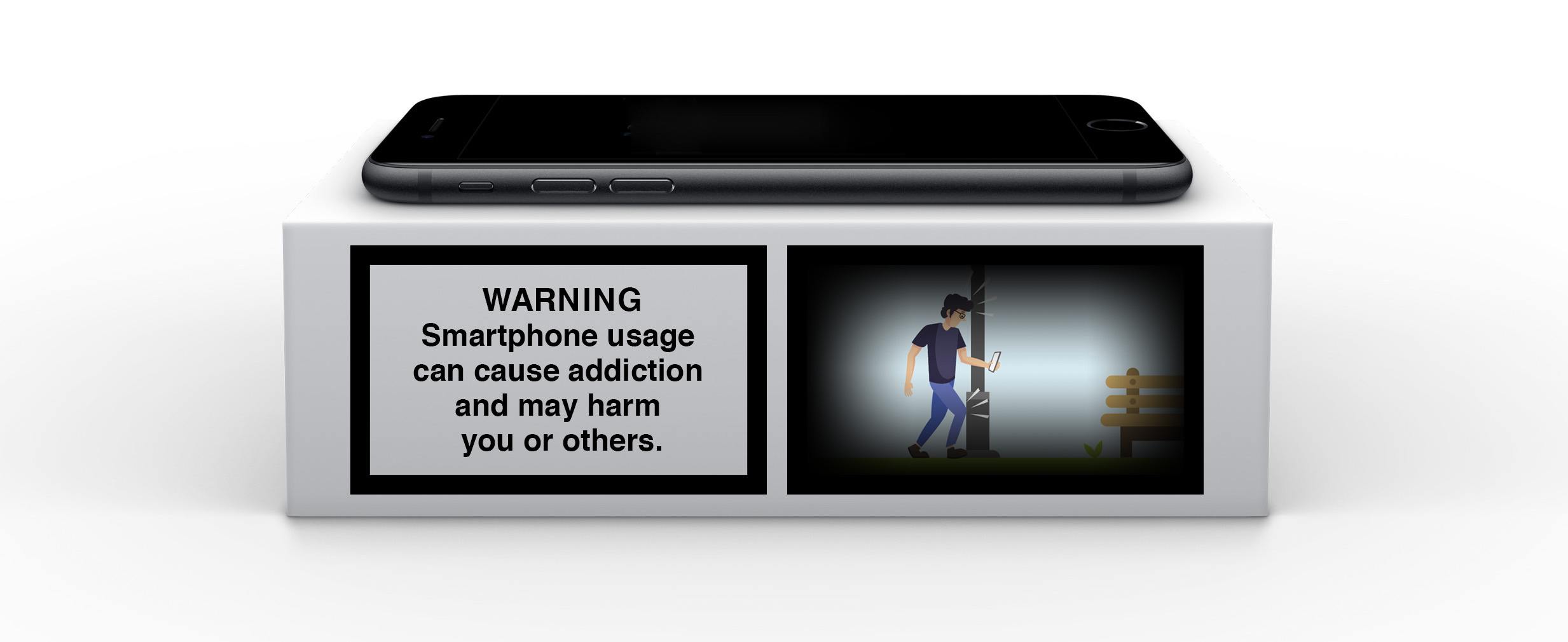
“Considering at what is currently going on, Orwell must have been an optimist,” says Valerio Zanetti, expert for machine learning and AI at T-Systems.
I agree with his cynical reference to George Orwell’s dystopia, 1984. Recent studies show that smartphone usage can result in symptoms similar to those of drug addicts or gamblers. An ever-growing thirst for the stimulation of the unknown is then rewarded with a dopamine kick, leading to the traditional downward spiral known from any addiction. Looking at smartphone users in public spaces, sucked into their four-inch mirrors reflecting a more colorful “parallel universe”, I see slaves controlled by devices that did not even exist two decades ago! But how did we get here? Or is it all just an utter misinterpretation?
To better understand the growing phenomenon, get answers and maybe even find solutions, I needed to gather experts from fields I believe will play a crucial role in how we treat or resolve this growing scare.
As a co-founder of DAY8, a socially driven venture with a vision to reduce technological dominance, I invited four experts from areas such as AI, government, education and mindfulness to a small panel talk held at Zurich’s startup magnet, Impact Hub.
Clear rules and imitable role models
Yves Karlen, professor in educational science, is ambivalent towards prohibiting technology from education: “Smartphone bans only worsen the effect. A more alleviated approach like limiting smartphones in schoolyards but at the same time integrating devices into the classroom, will add a lot more value overall and teach students how to handle technology the right way.” In order for this to happen, we need clear guidelines established, says Karlen. “Parents need to be integrated into this process and be sure —as kids look up to them— to play a role model that follows a responsible approach towards media consumption.”
But what is responsible media consumption? Isn’t there a difference between using the device to finding a location or doing research and following a never-ending feed on Instagram? Time spent with the smartphone or “screen time”, currently averaging at a staggering 145 minutes per day, cannot be condemned that easily. It depends on how and for what you use it. Valerio Zanetti, father of four, thinks this makes a big difference and explains how his kids use messaging and collaboration apps creatively in order to communicate or work on homework or science projects.
The device manufacturers must have come to the same conclusion: In their recent operating system updates for iOS and Android, our daily and weekly screen time is now not only visible but includes interesting information on whether we doodled on Facebook or have been writing on a blog article. The visual representation of our smartphone use is kind of a look into a mirror, which might trigger a revision of one’s habits. As a next step, we can even set time limits for specific apps or sites, setting ourselves boundaries enforced by our devices.
The limitations of regulations on our smartphones
But are these limits that are set by us and then enforced by our smartphones enough to fight potential addictions? Shouldn’t the government pitch in? After all, drugs and most things that make you addicted are prohibited or regulated as well.
David Schmidt (pseudonym, as he would like to remain anonymous), an employee at the federal administration, disagrees with calls for governmental regulation and states that we should step back and watch the phenomenon from a more elevated angle. “The hype should be deescalated. With every new technological phenomenon, quickly a full collapse of society is debated. We’ve had it when novels hit mainstream, TV entered households, and even chess was once criticized for making people lose touch with reality! Instead of blaming technology, focus should be on where the actual damage is done.” A topic that has been dealt with in recent years, treatment for smartphone addiction, which makes most sense after a certain level has been reached.
But of course, preventing addiction should be the goal in the first place. “However, smartphone paternalism, such as AI-based coaches to track, visualize and enforce our usage, essentially regulating our devices, would only hide the fact that smartphone addiction also reveals our vulnerabilities and what’s wrong with our society,” says Schmidt.
“Technology should not replace us but improve us with new skills”
Referring to human weaknesses and the growing invasive factor of tech and AI, Zanetti adds: “Automation or AI should not replace basic human tasks such as memorizing simple things or chores like doing the dishes. They have an important mental and physical function, some say even a spiritual component, that strengthens our willpower and reflects on our flaws. Technology and AI should not be there to replace us but to improve us with new skills – such as enabling us to see farther when flying a plane or seeing in the dark while driving a car.” Karlen agrees: “Technology can also add a lot of value and social benefit to our lives. Minecraft, for example, is a great example if played responsibly.”
It really is the dose that makes the poison, I’d say, referring to Paracelsus. But do we need to be saved from ourselves, since we can’t handle it on our own? Smartphone manufacturers do think so.
Wrong incentives create addictive features
But why do we need limitations in the first place? Are we simply not capable of managing the stimuli? “The asymmetric business models of tech platforms, in which free internet services are financed by ads, require hooked users that are available to those ads. It is, therefore, absolutely not in the interest of any company relying on this business model to have users reduce their screen time or to stop developing features that hook you to their services,” says Zanetti. So, as long as we don’t pay for the internet, these services will forever try to make us addicted and keep getting better at it. Knowing that these companies are playing according to the rules of the capitalistic market, expecting continuous growth, this isn’t likely to change anytime soon. But at least we now know it’s not just our fault.
The answer lies within
But what could prevent asymmetric business models and capitalistic greed from taking over our brains and making us to slaves to the system? I asked someone who knows how to deal with personal challenges: Reto Weishaupt, mindfulness coach and meditation teacher from MINDFULMIND. “Your mind can break patterns if you live a more conscious life with self-compassion, which is what mindfulness and meditation is all about. You may reduce unwanted behaviors since you see the effect they have on you more clearly. Besides teaching how to use technology correctly, schools should essentially incorporate mindfulness from a young age, making us more conscious humans and therefore less prone to domination and harm from technology.” Karlen agrees, but mentions that mindfulness is nothing new to the educational system and has been incorporated into disciplines for a long time. However, he thinks that the topic could be emphasized more.
For adults, Weishaupt recommends a simple mindfulness practice. Even guided meditation apps like Headspace or Oak can do the job and are in no way a fallacy just because they are consumed using technology. “Reducing the amount of notifications, completely going offline or going somewhere without your smartphone are other recommendations to decrease the vulnerability and teach your mind to let go.”
Let’s not just let evolution do the job
Our experts believe that current predictions are a possibility but a bit too dark. The evolution of Homo sapiens has always chosen a corrective path, which might happen in this case as well. Kids growing up with today’s technology will be the first to show how this plays out.
But what if evolution’s effort to fix the continuous and growing influence of our devices fails? Isn’t something wrong with how technology and internet services work? It’s not just our personal data or independence from technology and corporations, but also our societal health that is at stake. Maybe it is not us or our devices that should be regulated, but companies using asymmetric business models and the need for an ever-growing user base to sell ads to?
Realizing this, the whole paywall and paid services discussion should be given much more attention: it might be the way to normalize our relationship with technology by reducing dependency of these wrong incentives! Most social media platforms and everything with an underlying business model that is intended to make you addicted, should definitely be questioned more. After all, it could be the root cause of society’s potential downfall through technology.
What do you think? Is regulation for these businesses needed? Should large warning labels like the ones on cigarette packs be established? And what can we as individuals do? Let me know your ideas and opinions in the comments section.



